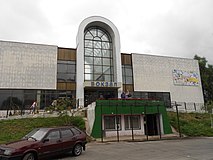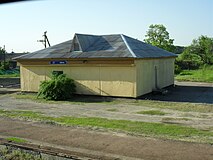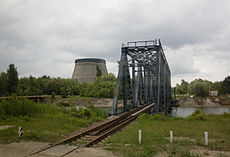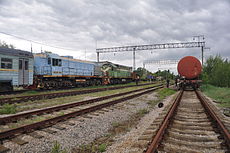Chernihiv–Ovruch railway
| Chernihiv–Ovruch railway | |
|---|---|
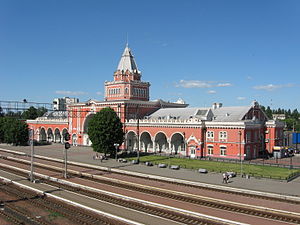 Chernihiv station building and platforms | |
| Overview | |
| Native name | Ukrainian: Дільниця Чернігів–Овруч Russian: Участок Чернигов–Овруч Belarusian: Ўчастак Чарнігаў–Оўруч |
| Status | Partially active (84.4 km) |
| Owner | Ukrainian Railways (UZ) |
| Locale | Ukraine, Belarus |
| Termini | |
| Service | |
| Type | Commuter rail |
| Operator(s) | Southwestern Railways (PZZ) |
| History | |
| Opened | 1930 |
| Technical | |
| Line length | 177.5 km (110.3 mi) |
| Track gauge | 1,520 mm (4 ft 11+27⁄32 in) (Russian) |
| Electrification | 25 kV 50 Hz AC (84,4 km) |
| |||||||||||||||||||||||||||||||||||||||||||||||||||||||||||||||||||||||||||||||||||||||||||||||||||||||||||||||||||||||||||||||||||||||||||||||||||||||||||||||||||||||||||||||||||||||||||||||||||||||||||||||||||||||||||||||||||||||||||||||||||||||||||||||||||||||||||||||||||||||||||||||||||||||||||||||||||||||||||||||||||||||||||||||||||||||||||||||||||||||||||||||||||||||||||||||||||||||||||||||||||||||||||||||||||||||||||||||||||||||||||||||||||||||||||||||||||||||||||||||||||||||||||||||||||
The Chernihiv–Ovruch railway is a partially electrified[4] and partially operational single track railway line that stretches between the town of Ovruch and the city of Chernihiv, in northern Ukraine, passing through southern Belarus and the Chernobyl Exclusion Zone. The line is owned by Ukrzaliznytsia alone, with railway stations located in Belarus being leased from the government of Belarus. A portion of the line between railway stations Vilcha and Semykhody has not been in service since the Chernobyl disaster, on 26 April 1986.
History
[edit]The line's construction started in 1928, as part of a modernization and development program of Southwestern Railways (Ukrainian: Південно-Західна залізниця). It was opened for passenger traffic in 1930.[5][6] Partially abandoned after the Chernobyl disaster of 1986, it works in its eastern section, between Chernihiv and Semikhody, a terminus station near Pripyat serving the Chernobyl Nuclear Power Plant. This line section was electrified in 1988.[7][8]
Route
[edit]Chernihiv-Slavutych-Pripyat
[edit]The line begins at the central station of Chernihiv, capital of the Chernihiv Oblast, located on the Minsk-Gomel-Kyiv line. After two minor stops within the city, it passes through a few small villages in Chernihiv Raion. At Zhukotky station began a now closed branch to Karkhivka and Zhydinychi. 36 km (22 mi) after Chernihiv the line reaches Slavutych, a city built in 1986 for the refugees fleeing the Chernobyl disaster. Its station replaced the pre-existing "Nerafa", demolished to build a larger station for the new city.[9]
After the stops in Lisnyi (in Slavutych) and Nedanchychi (in Chernihiv Raion) the line enters Belarus' Oblast of Gomel, passing over the Dnieper river. The station of Iolcha is the only functioning stop working on the Belarusian part of the line. It serves the villages of Staraya Iolcha, Novaya Iolcha, Krasnoe, and the near town of Kamaryn, all in Brahin Raion. After Iolcha, the line enters in the Polesie State Radioecological Reserve, created to enclose the territory of Belarus most affected by radioactive fallout from the Chernobyl accident, through three abandoned stations. The first one, Kaporenka, was the interchange point (in Russian: Пересадочная, "Peresadochnaya")[10] of an abandoned siding to a decontamination park.
The line then reenters Ukraine, joining Vyshhorod Raion, in Kyiv Oblast, and the Exclusion Zone. After Zymovyshche it passes over the Pripyat River and past a branch to the new Semikhody terminal station.[11] Built in 1988, the Semikhody station is a terminus that substitutes Semykhody stop, on the main line, and is the endpoint of the electrification and passenger service. Located in front of the nuclear plant, close to the New Safe Confinement, the terminus serves workers and is the only working station in Pripyat.[12][13]
Continuing on the main line, it passes the first industrial siding for the Chernobyl Plant and, after the so-called Bridge of Death, a second siding, just before Yaniv, the main station of Pripyat. The industrial line, which runs a loop around the nuclear plant passing between the 4 reactors and next to the cooling pond, is partially active because it allows goods and materials to be moved around the plant.[12]
Pripyat-Vilcha-Ovruch
[edit]Yaniv station, located between Yaniv village and the southern suburb of Pripyat, was an important passenger hub before the nuclear accident. It is the nearest station to Chernobyl town, 18 km (11 mi) south, and nowadays is a railroad graveyard, with a high number of abandoned trains, making it one of the tourist sights in Pripyat. The station, refurbished in the 2010s, is used by workers of the society "Chornobylservis" (Ukrainian: Чорнобильсервіс)[11] for fixing heavy machinery.[14][15][16]
After leaving Pripyat, the line continues through a forested area, highly contaminated at several points. It is rarely used by freight trains serving the nuclear plant and passes several villages, such as Buriakivka, known for its large vehicle graveyard full of abandoned radioactive machinery.[17] After Tovstyi Lis the line runs along the border between the "10-km" and "30-km" zones and enters Vyshhorod Raion. It passes through the ghost town of Vilcha, 17 km (11 mi) north of Poliske, today one of the checkpoints to the Exclusion Zone. This section of the line is the most decrepit, with the track invaded by vegetation and the station buildings mostly in ruins.[13][18]
Leaving Vilcha, the line enters Narodychi Raion of the Zhytomyr Oblast and after Radcha, the line reaches Ovruch Raion. It crosses several villages and ends at Ovruch station, on the line linking Mazyr to Korosten. The Vilcha-Ovruch section, de jure operating but de facto abandoned, has had no passenger services since 1986. Vilcha station was open until 2013.[13][19][20]
Train services
[edit]Until 1986, the entire line was served by regional and long-distance trains such as the Moscow-Khmelnytskyi express service.[6][14] Current passenger services include the following trains:
| Category | Route (RT) | Notes |
|---|---|---|
| Regional | Chernihiv-Slavutych-Iolcha | With not all stations served, the Nedanchychi-Iolcha service, passing the Belarusian border, is limited.[10][4] |
| Regional | Slavutych-Semikhody | Non-stop train, for Chernobyl Plant workers[4] |
In popular culture
[edit]Ovruch station was mentioned in the 1963 book The Truce (Italian: La tregua), by the Italian writer Primo Levi. It was a stop on his roundabout 1945 trip from the Auschwitz concentration camp to his home in Turin.[21][22][23]
Yaniv station appears as an accessible location in the 2009 video game S.T.A.L.K.E.R.: Call of Pripyat.
Gallery
[edit]-
Abandoned trains at Yaniv station
-
A rail track nearby Vilcha station
-
Ovruch station building
See also
[edit]References
[edit]- ^ in english: Island
- ^ in english: Town
- ^ in english: Transfer Point
- ^ a b c ""All Aboard for Chernihiv"". Radioactive Railroad. Archived from the original on 2015-11-27. Retrieved 2015-11-25.
- ^ (in Russian) Юго-Западная железная дорога. Вчера. Сегодня. Завтра ("Southwestern Railways: Yesterday, Today, Tomorrow"). 244 pp., Kyiv, «Transport of Ukraine» 1995. ISBN 5-7707-7927-6
- ^ a b ""The Ovruch to Chernihiv Rail Link"". Radioactive Railroad. Archived from the original on 2015-11-25. Retrieved 2015-11-25.
- ^ "Railway map of Ukraine and Moldova showing rail traction". www.bueker.net. Archived from the original on 2018-04-06. Retrieved 2019-01-07.
- ^ (in Russian) "Island" electrified lines in the countries of the former Soviet Union infojd.ruArchived 2012-07-23 at archive.today
- ^ ""Reborn in Slavutych"". Radioactive Railroad. Archived from the original on 2015-11-25. Retrieved 2015-11-25.
- ^ a b (in Ukrainian) Southwestern Railway timetable for Chernihiv-Iolcha service Archived 2015-12-08 at the Wayback Machine
- ^ a b "The Pripyat Railway Bridge" (Lost Places)
- ^ a b ""Trains in the Exclusion Zone"". Radioactive Railroad. Archived from the original on 2015-11-25. Retrieved 2015-11-25.
- ^ a b c "Ovruch-Chernihiv line scheme". Radioactive Railroad. Archived from the original on 2015-11-21. Retrieved 2015-11-25.
- ^ a b ""Permanently Contaminated: The Railroad Graveyard"". Radioactive Railroad. Archived from the original on 2015-11-25. Retrieved 2015-11-25.
- ^ ""Railway station Yaniv"". Lost Places. Archived from the original on 2015-11-25. Retrieved 2015-11-25.
- ^ ""Yaniv Train Station - Pripyat"". UrbanX. Archived from the original on 2015-11-25. Retrieved 2015-11-25.
- ^ ""Chernobyl Rescue Operation: The Vehicle Graveyard"". Urban Ghosts. Archived from the original on 2015-11-26. Retrieved 2015-11-25.
- ^ "Securing the Chornobyl exclusion zone against illegal movement of radioactive materials" irpa.net Archived 2015-11-25 at the Wayback Machine (IRPA)
- ^ ""Abandoned: The Radioactive Railroad"". Radioactive Railroad. Archived from the original on 2015-11-25. Retrieved 2015-11-25.
- ^ ""On "diesel engine" on the Zone"". Lost Places. Archived from the original on 2015-11-25. Retrieved 2015-11-25.
- ^ (in Italian) "Ovruch" Archived 2016-08-17 at the Wayback Machine primolevi.it
- ^ See map on Commons
- ^ La Tregua. Einaudi, Turin, 1963 - ISBN 0-349-10013-6
External links
[edit]- Schematic map of the Southwestern Railway Archived 2021-10-10 at the Wayback Machine. Southwestern Railway website.
- wikimapia.org
- Radioactive Railroad
- Lost Places - Chornobyl Zone
- Chernobyl Commuter Train on Vimeo
- Поезд на ЧАЭС / Train to ChNPP on YouTube
- Tourist attractions in Chernihiv
- Buildings and structures in Chernihiv
- Southwestern Railways
- Chernobyl Exclusion Zone
- Railway lines opened in 1930
- Railway lines closed in 1986
- Buildings and structures in Chernihiv Oblast
- Buildings and structures in Gomel region
- Buildings and structures in Kyiv Oblast
- Buildings and structures in Zhytomyr Oblast
- Tourism in Chernihiv





